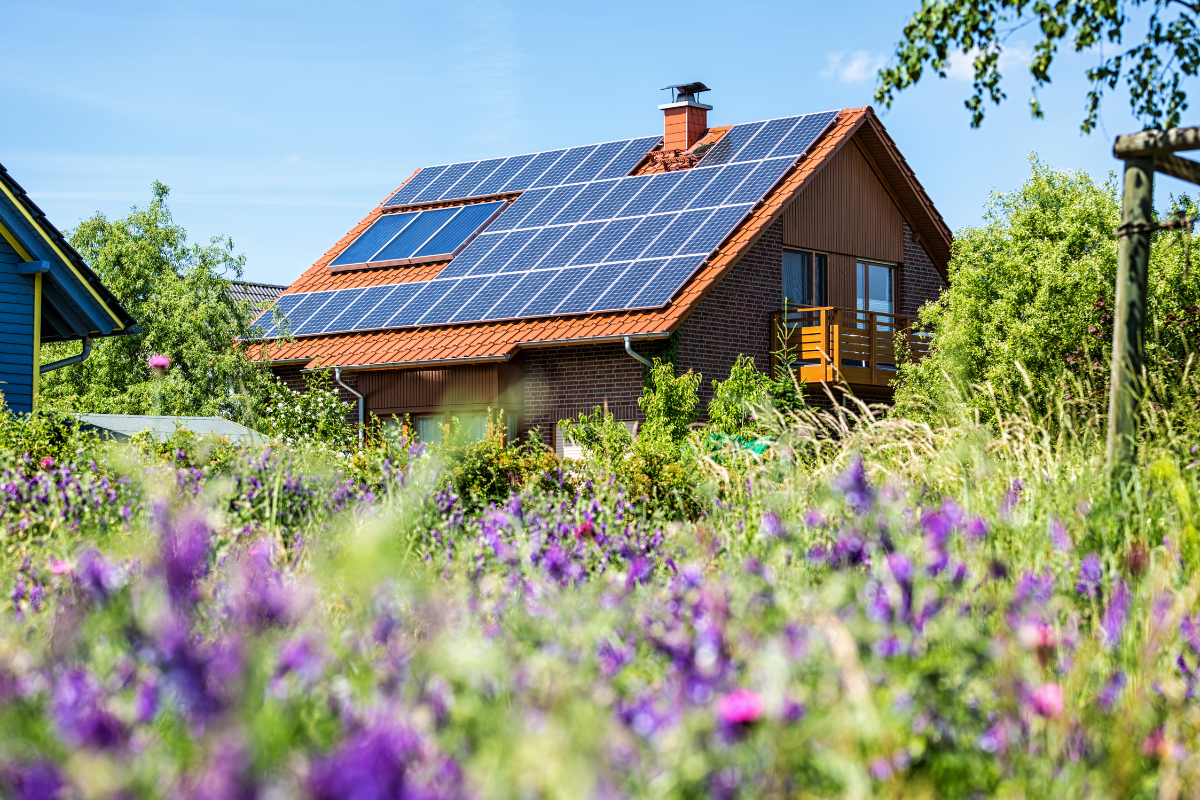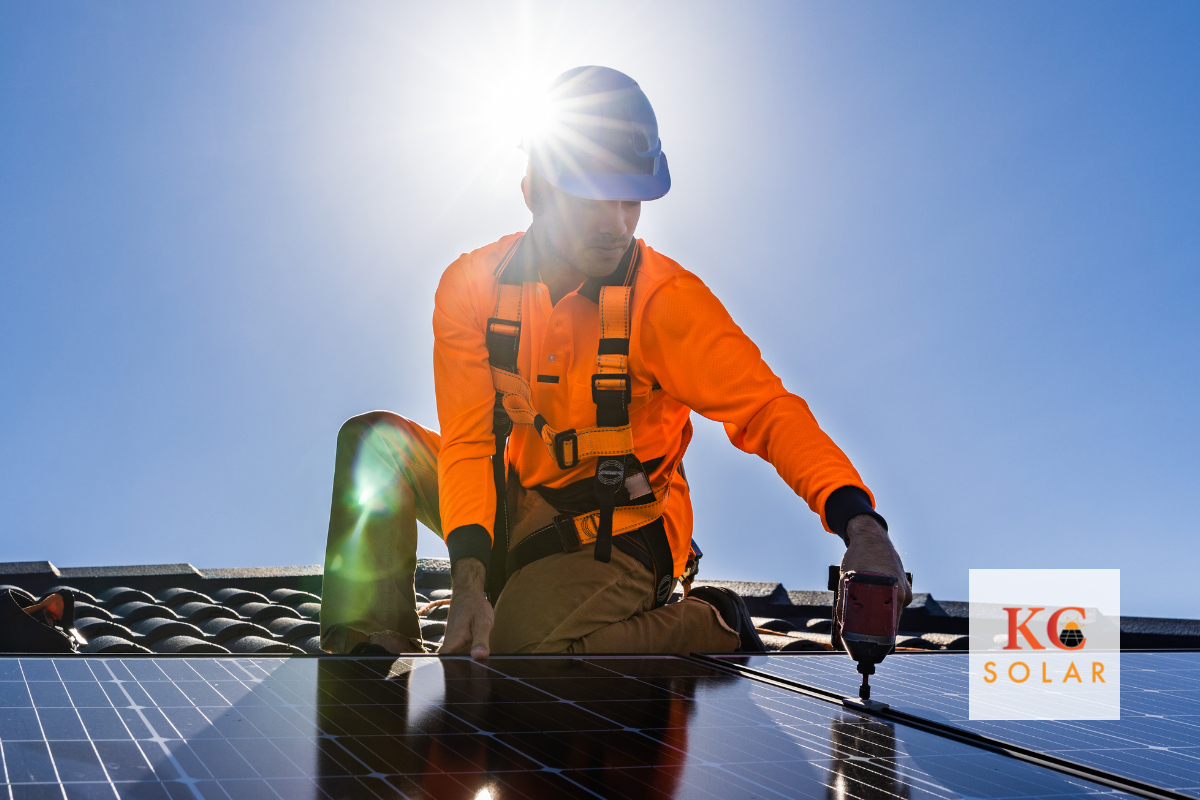Here in Kansas City, it seems like spring is finally here. Not the false spring, where we get random 80-degree days in February and March and it feels like we’ve put winter behind us already — only for it to snow at some point in April. That’s always fun. In the Midwest, we know that we get to experience all four seasons… sometimes in the same day. But when it comes to solar panels, how does the weather impact solar panel energy production?
In KC, we know there’s no such thing as consistent weather. Which means it’s a fair question to wonder how all the extreme temperatures and weather changes affect your solar system.
Keep reading to find out when solar panels produce the most energy and when they’re most efficient, as well as the impact this could have on your energy bills.
When Do Solar Panels Produce the Most Energy?
Think about what it takes for solar panels to produce energy: sunlight. If you had to take a guess about when solar panels produce the most energy, what would you say?
If you guessed summer, you’re correct.
Here are a few reasons why summer is the best season for producing the most solar energy:
- The Days Are Longer: Forget those horrible January days where it gets dark at 4:30 p.m. and there aren’t even any Christmas lights to brighten things up. With long days in the summer — when the sun doesn’t set until about 9 p.m. — your solar panels are exposed to sunlight for longer periods of time. Meaning they have more time to produce electricity throughout the day, every day.
- The Sunlight Is More Direct: Not only are the days longer, but the sun is much higher in the sky than throughout other times of the year. While solar panels can work without direct sunlight, more direct sunlight is better. They’ll produce more energy in direct sunlight compared to lower-light conditions.
- Clear Summer Days: Similar to the last point, summer days in the Midwest tend to have clearer skies and fewer clouds. Which means that direct sunlight is able to hit your solar panels and produce more electricity. Other seasons throughout the year typically have more overcast days, which aren’t a problem for your solar panels, but clouds can be an obstacle to producing as much energy as possible.
When Are Solar Panels Most Efficient?
So, if solar panels produce the most electricity in the summer, that would mean they’re operating at their highest efficiency, right?
Not quite.
While it may seem counterintuitive, solar panels are actually at their most efficient in the winter months.
It all has to do with how electricity works. The photovoltaic (or PV) cells on your solar panel are what converts solar energy into electricity. And these PV cells are more efficient in colder weather because electrical conductivity improves in lower temperatures.
The electrons inside the PV cells are at rest — until sunlight, which is full of energy, hits them. Because of the large voltage difference that is created, electricity is generated. And this is why solar panels work more efficiently in colder temperatures.
In fact, most electronic devices function better at lower temperatures — from computers, to household appliances and more. Heat can reduce solar panel efficiency by 10-25% as the weather becomes warmer.
What Does This Mean For Solar Customers?
The fact that solar panels produce more energy in summer, and are more efficient in winter, is great news for solar customers.
It means that, no matter what type of climate you live in, or no matter whether you have crazy weather fluctuations throughout the year (or day), your solar system usage will be balanced. You’re either producing a ton of energy, or you’re producing energy efficiently. It’s a win-win.
In some places, you may even be able to take advantage of net metering to keep your electricity bills low — and consistent — all year long.
With net metering, homeowners are able to access and use a surplus of stored energy that they have collected throughout the year. On the higher production days, the extra energy that is not used is able to be stored away in the local power grid and used during lower production days.
That way, during the summer months, solar users are able to build on their net metering credit in the power grid.Then, the power would be redistributed throughout the year to be used throughout the colder winter months.
How to Monitor Your Solar Panel Energy Production
If you want a closer look at your solar panels’ energy producing, there are plenty of monitoring apps out there with a variety of features. All you need is your smartphone, and your solar panel data will be in the palm of your hand.
Many of the solar panel monitoring apps on the market allow you to track your solar system’s output and energy production. They also may be accessible from other internet-enabled devices, including computers or tablets.
Keeping an eye on certain indicators and metrics can help you maximize your solar system’s performance. It can also identify problems with your system that you might otherwise miss — for example, if one of your panels isn’t working as intended, it could mean that too much debris is covering your solar panel and it needs to be cleaned.
Here are five of the most popular solar monitoring apps.
No Matter the Weather, KC Solar Is Your Local Solar Company
If you are looking for the best solar company in Kansas City, look no further than KC Solar. We are your local Kansas City solar panel installation experts. Once you schedule a no-pressure site visit, our experts will help you understand what solar system specifications would be best for your home or business.
KC Solar is the only local solar company in Kansas City with KC natives who own and operate the daily activities of the business. What does that mean for you? We care about you because we care about this city. And we are here to be your local Missouri solar and Kansas solar installers.
And be sure to download our Free Solar Panel Buying Guide for more information.






